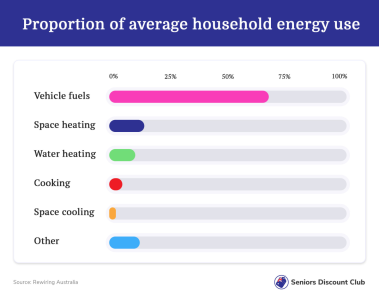Making this energy switch could save you $450 yearly
- Replies 24
With gas prices skyrocketing, Australian households could save big by switching from gas to electric appliances, according to a new report.
The study from Monash University forecasted that going electric could save the average home a whopping $450 per year, or $4.9 billion in potential savings annually.
Amelia Pearson, the Project Coordinator at Monash's Research Hub, highlighted the advantages of electrified homes, emphasising their long-term cost-effectiveness and potential health benefits.
'As gas prices continue to overtake the cost of electricity, electrification makes more financial sense for Australian households,' she said.

'Electrification is more efficient, cheaper to run, and allows us to tap into our abundant renewable energy resources like solar and wind, and will accelerate the decarbonisation of Australia's economy,' Ms Pearson added.
The report revealed that gas is primarily used for space heating, constituting 57 per cent of its consumption, while hot water heating and cooking comprise approximately 35 per cent and 5 per cent, respectively.
By transitioning to electric water heating, households could collectively save over $2 billion, while electric space heating could result in savings exceeding $1 billion. Switching to electric cooking could save households more than $340 million.
The study also explained that using a quality heat pump for a four-person household would cost between $145 and $175 annually during off-peak hours, compared to the $435 to $635 expenses associated with a gas system.
Apart from the financial advantages, transitioning to electric appliances doesn't just save money for households; it can also have a positive impact on health, especially for those with pre-existing respiratory conditions.
The report explained that gas cookers and heaters are major sources of indoor pollution. This can result in respiratory problems, cancer, and a higher likelihood of mortality, as noted by Dr James Burgmann-Milner.
'Making the switch from gas to electric drastically reduces exposure to pollutants that pose short and long-term health risks,' he said.
The report assessed the performance of state and territory governments in facilitating the transition from gas to electricity for households.
According to the findings, the ACT and Victoria received high ratings for their effective financial support and efforts in reducing household emissions in this transition.
On the other hand, Western Australia (WA) and the Northern Territory (NT) were found to lag behind in providing financial assistance for such measures.
Why don't more households switch from gas to electric if it has so many benefits? Well, it's not as simple as it sounds.
There are a few reasons why it's not easy for people to make the switch. Some renters can't choose their appliances, and apartments often include gas bills in their fees. There might not be enough space for electric heating systems, and the upfront costs can be a challenge. Some people also simply prefer cooking with gas.
To make it easier for people to switch to all-electric homes, a report from the ABC suggested that the government could do a few things.
They could stop allowing new gas connections to homes, give landlords tax breaks for investing in electric appliances, gradually require rental properties to be all-electric, and upgrade public housing to use electric systems.

Members, if you're considering going electric, contact your state or territory government to learn about any rebates or incentives available. And chat with your energy provider, retailer or installer about running the numbers to calculate your potential savings.
We hope you found this article helpful and informative! What are your thoughts on making the switch? Let us know in the comments below!
The study from Monash University forecasted that going electric could save the average home a whopping $450 per year, or $4.9 billion in potential savings annually.
Amelia Pearson, the Project Coordinator at Monash's Research Hub, highlighted the advantages of electrified homes, emphasising their long-term cost-effectiveness and potential health benefits.
'As gas prices continue to overtake the cost of electricity, electrification makes more financial sense for Australian households,' she said.

According to a study, Australian households can save $450 a year on their energy bills by making the switch from gas to electricity. Credit: Shutterstock.
'Electrification is more efficient, cheaper to run, and allows us to tap into our abundant renewable energy resources like solar and wind, and will accelerate the decarbonisation of Australia's economy,' Ms Pearson added.
The report revealed that gas is primarily used for space heating, constituting 57 per cent of its consumption, while hot water heating and cooking comprise approximately 35 per cent and 5 per cent, respectively.
By transitioning to electric water heating, households could collectively save over $2 billion, while electric space heating could result in savings exceeding $1 billion. Switching to electric cooking could save households more than $340 million.
The study also explained that using a quality heat pump for a four-person household would cost between $145 and $175 annually during off-peak hours, compared to the $435 to $635 expenses associated with a gas system.
Apart from the financial advantages, transitioning to electric appliances doesn't just save money for households; it can also have a positive impact on health, especially for those with pre-existing respiratory conditions.
The report explained that gas cookers and heaters are major sources of indoor pollution. This can result in respiratory problems, cancer, and a higher likelihood of mortality, as noted by Dr James Burgmann-Milner.
'Making the switch from gas to electric drastically reduces exposure to pollutants that pose short and long-term health risks,' he said.
The report assessed the performance of state and territory governments in facilitating the transition from gas to electricity for households.
According to the findings, the ACT and Victoria received high ratings for their effective financial support and efforts in reducing household emissions in this transition.
On the other hand, Western Australia (WA) and the Northern Territory (NT) were found to lag behind in providing financial assistance for such measures.
Why don't more households switch from gas to electric if it has so many benefits? Well, it's not as simple as it sounds.
There are a few reasons why it's not easy for people to make the switch. Some renters can't choose their appliances, and apartments often include gas bills in their fees. There might not be enough space for electric heating systems, and the upfront costs can be a challenge. Some people also simply prefer cooking with gas.
To make it easier for people to switch to all-electric homes, a report from the ABC suggested that the government could do a few things.
They could stop allowing new gas connections to homes, give landlords tax breaks for investing in electric appliances, gradually require rental properties to be all-electric, and upgrade public housing to use electric systems.
Key Takeaways
- Australian households can save approximately $450 annually by switching from gas to electricity, according to a Monash University report.
- The study suggested that the electrification of households has several benefits, including financial savings and improved health outcomes.
- Indoor pollution from gas, particularly from cookers and heaters, can cause significant health problems, including respiratory issues and an increased cancer risk.
- The report ranked Australian states and territories based on their support for households in making the switch to electricity, with ACT and Victoria rating highly.
Members, if you're considering going electric, contact your state or territory government to learn about any rebates or incentives available. And chat with your energy provider, retailer or installer about running the numbers to calculate your potential savings.
We hope you found this article helpful and informative! What are your thoughts on making the switch? Let us know in the comments below!








